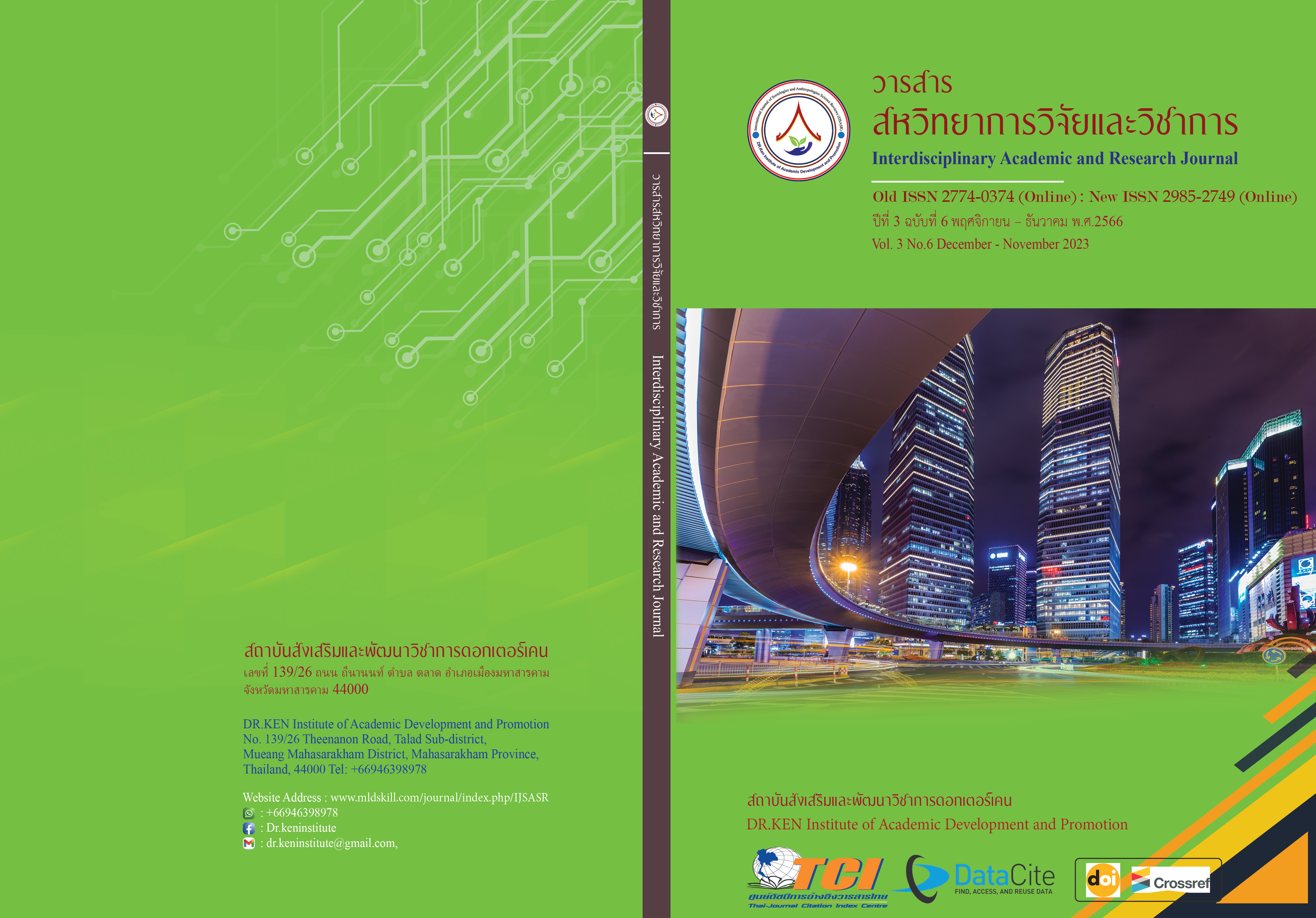Development of a Plan for Learning Activities Using the Atlas Technique Substances in Everyday Life to Promote Scientific Learning of Grade 6 Students
DOI:
https://doi.org/10.60027/iarj.2023.270918Keywords:
Learning by Atlas Techniques; , Development of Learning Activity PlansAbstract
Background and Aims: Using atlas techniques in teaching and learning is very useful in stimulating students' knowledge and understanding of science subjects. In addition to experiments and activities that emphasize student participation. The use of technology in teaching is an important part of the atlas, such as using computer programs to simulate experiments, or presenting work via online media Technology makes teaching more effective and interesting. The research objectives of this research were 1) to develop a learning activity plan using the Atlas technique. Stories in everyday life 2) To find the effectiveness index of learning activities plan using the Atlas technique. Stories in everyday life 3) To compare the science learning achievement of students learning by using the learning activity plan using the Atlas technique. Stories in everyday life on the science learning achievement of Prathom Suksa 6 and 4 students) to study the students' satisfaction towards learning by using the activity plan. Learning using the Atlas technique Stories in everyday life on the science achievement of students grade 6.
Methodology: Target groups: Prathom Suksa 6 students, Ban Lao Yung School, Khok Lam Sub-district, Chaturapat Phiman District. Roi Et Province, 1 classroom, 24 people. The research tools consisted of 1) a learning activities plan, 2) a learning achievement test, and 3) a satisfaction questionnaire. Statistics used in data analysis were percentage, mean, and standard deviation. and t–test (Dependent Samples).
Results: (1) Learning activities plan using Atlas technique Stories in everyday life on the science learning achievement of Prathom Suksa 6 students with efficiency values of 84.55/81.52. (2) Learning activities plan using Atlas technique Stories in everyday life to the science learning achievement of grade 6 students had an effectiveness index equal to .5345, indicating that the progress had increased by 53.45%. (3) Students who learn using the Atlas Learning Activity Plan Stories in everyday life to affect the academic achievement in science of Grade 6 students with academic achievement. after school is higher than before statistically significant at the .01 level. (4) Students who learn using the learning activity plan using the Atlas technique on daily life messages on the science learning achievement of Prathom Suksa 6 students, the overall satisfaction was at the highest level.
Conclusion: The use of learning activity plans using the Atlas technique on substances in daily life in Grade 6 had an average efficiency of 84.55/81.52 and an effectiveness index of .5345 indicating progress. That improved by 53.45 percent. In addition, students who used the plan had higher achievement in science learning after studying than before studying at a statistical significance of .01 and had the highest level of overall satisfaction.
References
กระทรวงศึกษาธิการ. (2557). แนวทางการจัดการเรียนรู้วิทยาศาสตร์ด้วยเทคนิคแอทลาส. กรุงเทพฯ: กระทรวงศึกษาธิการ.
คณะครุศาสตร์ จุฬาลงกรณ์มหาวิทยาลัย. (2563). คู่มือการจัดการเรียนรู้วิทยาศาสตร์ด้วยเทคนิคแอทลาส. กรุงเทพฯ: คณะครุศาสตร์ จุฬาลงกรณ์มหาวิทยาลัย.
ดลฤดี ไชยศิริ. (2563).การส่งเสริมแรงจูงใจใฝ่สัมฤทธิ์ทางการเรียน โดยใช้การเรียนรู้แบบผสมผสานร่วมกับแนวคิด เกมิฟิเคชัน สำหรับนักเรียนชั้นมัธยมศึกษาปีที่ 4 โรงเรียนผดุงนารี. การประชุมวิชาการผลงานวิจัยระดับบัณฑิตศึกษาแห่งชาติ ครั้งที่ 21 วันที่ 27 มีนาคม 2563 ณ มหาวิทยาลัยขอนแก่น
วันเทา มลาศรี. (2561). การพัฒนาชุดกิจกรรมการเรียนรู้ เรื่องสารในชีวิตประจำวันโดยใช้กระบวนการ การเรียนรู้แบบร่วมมือเทคนิค STAD ระดับชั้นประถมศึกษาปีที่ 6. มหาวิทยาลัยราชภัฏบุรีรัมย์, บุรีรัมย์.
สถาบันส่งเสริมการสอนวิทยาศาสตร์และเทคโนโลยี. (2557). ความรู้เบื้องต้นสะเต็ม. กรุงเทพฯ: สถาบันส่งเสริมการสอนวิทยาศาสตร์และเทคโนโลยีกระทรวงศึกษาธิการ.
สถาบันส่งเสริมการสอนวิทยาศาสตร์และเทคโนโลยี. (2561). คู่มือการจัดการเรียนรู้วิทยาศาสตร์ด้วยเทคนิคแอทลาส. กรุงเทพฯ: สถาบันส่งเสริมการสอนวิทยาศาสตร์และเทคโนโลยี.
สำเนียง พุทธา. (2550). การพัฒนาชุดกิจกรรมการเรียนรู้ เรื่อง สารเคมีที่เป็นพิษในอาหารสำหรับนักเรียน ชั้น มัธยมศึกษาปีที่ 1. การศึกษาค้นคว้าอิสระ.มหาวิทยาลัยมหาสารคาม, มหาสารคาม.
สุภาภรณ์ ฤมิตร. (2561). แผนการจัดกิจกรรมการเรียนรู้โดยใชการบูรณาการ แนวคิด CCR เพื่อส่งเสริมผลสัมฤทธิ์ทางการเรียนวิชาวิทยาศาสตร์ เรื่อง สารในชีวิตประจําวัน ของนักเรียนชั้น มัธยมศึกษาปีที่ 2. มหาวิทยาลัยราชภัฏกำแพงเพชร, กำแพงเพชร.
Caceffo, R., Gama, G.A.R., & Azevedo, R. (2018). Exploring Active Learning Approaches to Computer Science Classes. 922-927. doi: 10.1145/3159450.3159585
Partanen, L., & Partanen, L. (2018). Student-centered active learning approaches to teaching quantum chemistry and spectroscopy: quantitative results from a two-year action research study. Chemistry Education Research and Practice, 19(3),885-904. doi: 10.1039/C8RP00074C
Wang, H. (2023). Research on Smart Classroom Teaching Based on Learning Science. Science Insights Education Frontiers, 15(1),6-6. doi: 10.15354/sief.23.s1.ab006
Zhou, Y. (2022). Teaching Mixed Methods Using Active Learning Approaches. Journal of Mixed Methods Research, 155868982211205-155868982211205. doi: 10.1177/15586898221120566
Downloads
Published
How to Cite
Issue
Section
License
Copyright (c) 2023 Piyathida Duangkamchan, Phusit Boonthongteng

This work is licensed under a Creative Commons Attribution-NonCommercial-NoDerivatives 4.0 International License.
Copyright on any article in the Interdisciplinary Academic and Research Journal is retained by the author(s) under the under the Creative Commons Attribution-NonCommercial-NoDerivatives 4.0 International License. Permission to use text, content, images, etc. of publication. Any user to read, download, copy, distribute, print, search, or link to the full texts of articles, crawl them for indexing, pass them as data to software, or use them for any other lawful purpose. But do not use it for commercial use or with the intent to benefit any business.
















.png)


